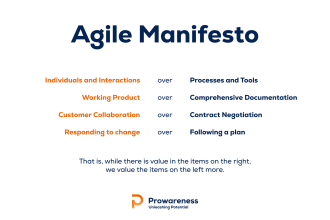Agile
expertise
Agile working allows your organization to respond quickly to change. It is a flexible way of thinking and working in which you do not plan everything in detail in advance, but adapt to changing circumstances.

What is Agile?
Agile means being adaptable, nimble, or flexible. The term originated in software development, where it refers to creating software in short, manageable periods—typically ranging from a week to a month. These periods are known as 'iterations.' Although Agile began in software development, it is now widely used across various industries. Using Agile methods improves processes, enhances projects, and strengthens team dynamics and collaboration.
Why is it so valuable?
The Agile Manifesto
The Agile Manifesto, drafted in 2001, was a turning point in project management. Seventeen software developers came together to break away from traditional methods of excessive documentation and planning, which often resulted in the loss of customer satisfaction. The manifesto introduced flexibility, collaboration and rapid adaptation, leading to faster results and maximum value for customers.
The Agile Manifesto emphasizes four core values and 12 principles that focus on customer satisfaction, adaptability and continuous improvement. This has not only transformed software development, but also inspired other industries to manage projects more effectively.

The power of Agile lies in making small steps, finishing things and learning by doing.
The power of small steps
The Agile mindset
The power of Agile lies in tackling complex situations. The motto is: just do it! Don't get stuck in preparations or planning, but get started. By starting, you gradually discover what the next step should be. This requires a mindset of confidence and guts.
After completing a short task, analyze and reflect to determine the next goal. Compare it to a dolphin: it swims underwater, jumps up to breathe and dives under again to continue swimming to the next goal. Even if all the goals are fixed and the team is confident, it is important to keep critical thinking and continuous improvement.
In short, the power of Agile lies in making small steps, completing things, testing whether it was done right and learning by doing.


Agile courses
Would you like to know more about our training topics?
